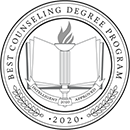
M.A. in Pastoral Counseling
Counseling Tools to Reinforce Your Call to Ministry
Whether you’re a pastor, nonprofit leader or looking to add counseling tools to your role in another field, the nonlicensure M.A. in Pastoral Counseling will equip you with biblically centered counseling tools to help others through decisions and crises. This online master’s in counseling degree program draws from the Christian psychology, mental health counseling and clinical pastoral education fields.
Develop a Customized Network of Community Resources
Become a gatekeeper to professional services as you build relationships with professors, fellow students and community agencies/nonprofits.
Reinforce Your Pastoral/Clergy Role
Learn counseling techniques and gain knowledge in areas such as marriage and family, substance abuse and crisis counseling.
Prepare to Make a Lasting Difference
Join a respected network of dedicated Regent mental health practitioners leading in their field through the integration of science and faith.
Courses are taught from a Christian worldview by renowned faculty in Virginia Beach and beyond.

|
Through this master’s in pastoral counseling degree, you will:
- Learn how to address legal, ethical and liability issues.
- Evaluate treatment issues and gain guidance for referral and collaboration.
- Integrate biblically based strategies for effective emotional and spiritual healing.
Career Opportunities
- Pastoral Care
- Family Service Centers
- Christian Schools
- Church Counseling Centers
- Coaching
A written examination with an oral option that serves as a culminating activity. Pass/No Pass.
Addresses comprehensive concepts of ethical, legal, moral and spiritual issues in counseling ministry. Relevant case studies form a basis for discussion. Cross-listed with HSC 505.
A focus on the practice of basic micro-processing communication skills which form the foundation to counseling competencies and other listening based human interactions. Emphasis on the demonstration, modeling, practice, and evaluation of these core skills and techniques. Cross-listed with HSC 524.
Overview of marriage and adult relationships. Analysis of one’s own marriage and/or family of origin will facilitate deeper understanding. Examine systems theory, life span, and issues associated with marriage counseling such as premarital counseling, marriage enrichment, sexuality, and divorce/remarriage. Presents a multicultural focus pertaining to marriage, adult relationships and ministry. Cross-listed with HSC 544.
Continuation of Models & Strategies with advanced lay counseling intervention strategies, techniques, and care-giving activities. Examines grief and loss, forgiveness, responding to critical incidents and crisis counseling, community trauma and disaster, chaplaincy issues, stress/burnout, and compassion fatigue issues. Presents a multicultural focus relating to intervention strategies and ministry. Cross-listed with HSC 561 and MHPS 761.
Didactic and experiential course to expand personal and professional relationship competencies in working with people in our contemporary, pluralistic society as it pertains to counseling ministry. Cross-listed with HSC 570.
A scholarly survey of the Bible, Christian theology, and Christian history designed to provide graduate level exposure to these three areas of Christian scholarship for students who do not have prior equivalent study. Cross-listed with HSC 577 and PSY 777.
Combined reflection and analysis of an applied field experience with course-based discussion of the integration of Christianity and human service work. Students must obtain a total of 150 hours of pre-approved on-site experience, including 50 contact hours in human services work with identifiable client/participants. Cross-listed with HSC 596 and MHPS 696.
Strategies for effective emotional and spiritual healing in the unique context of the Church. Presents models for biblically based, spiritually-gifted strategies to address key issues as an integrated part of the mentoring and disciple-making process.
2020-2021 Semester Check-In Deadlines:
All new students are expected to check-in for the semester 2 weeks prior to the session start date. Students should apply, be accepted, enroll in their first courses, and confirm a plan to pay for their courses prior to this date.
| Session | Semester Check-In | Session Start Date |
| Session A | Friday, August 14 | Monday, August 24 |
| Session M | Friday, September 11 | Monday, September 21 |
| Session B | Friday, October 16 | Monday, October 26 |
| Session C | Tuesday, January 5 | Monday, January 11 |
| Session T | Friday, January 29 | Monday, February 8 |
| Session D | Friday, March 5 | Monday, March 15 |
| Session E | Friday, April 30 | Monday, May 10 |
| Session F | Friday, June 11 | Monday, June 21 |
Prerequisites:
Master’s applicants must:
- Hold a B.A. or B.S. from a regionally accredited college or university. Desirable degrees include those in counseling, psychology or related human behavioral fields. Other degree fields will also be considered.
- Have a minimum of a 3.0 GPA for all undergraduate coursework.
Application Process:
The Admissions Committee may require a brief Admissions Interview on a case-by-case basis. Interviews are conducted over the phone or Skype with one of our admissions staff and/or SPC faculty members and typically take 20 minutes.
Step 1: Application
Submit your application using our Regent University Online Application
Step 2: Application Fee
Pay the nonrefundable $50 application fee by check or money order mailed to Regent University, Enrollment Support Services, 1000 Regent University Drive, Virginia Beach, VA 23464.
Step 3: Submit your Unofficial College Transcripts*
We are able to examine and view your unofficial transcript from a U.S.-based school, which indicates successful completion of a bachelor’s degree program, in order to review you for an admissions decision. Please submit your unofficial transcript to our Admissions Office by email to apply@regent.edu using the subject line: SPC Master’s Application Pieces.
Non-U.S. transcripts must be evaluated by an NACES-approved company. For further details, please review the International Admissions Checklist on the International Students Admissions page.
International Applicants: Please visit the International Students Admissions page for a more detailed explanation of the Regent University application information and to determine whether or not you qualify as an international student.
*Upon conditional acceptance to the program by review of unofficial transcripts, Regent University’s Admissions Office will attempt to obtain your official transcripts from your U.S. degree-granting institution, which indicate successful completion of a bachelor’s degree program. We will notify you if your previous institution will not release transcripts directly to us.
Step 4: Complete an Academic Background Questionnaire
Step 5: Government-Issued ID
To ensure academic integrity, Regent University requires a copy of a government-issued ID. Please email a scanned copy or photograph of it to apply@regent.edu with the subject line: Government ID.
Please feel free to contact the Office of Admissions at 757.352.4498 or email psycounadmissions@regent.edu, should you have any further questions about the application process.
Note: All items submitted as part of the application process become the property of Regent University and cannot be returned.
2019-20 Tuition Rates
| Degree Level / Program | Cost Per Credit Hour |
|---|---|
M.A. in Pastoral Counseling | $595 per credit (In-state & Out-of-state) |
Student Fees Per Semester
| University Services Fee (Online Students) | $550 |
2020-21 Tuition Rates
| Degree Level / Program | Cost Per Credit Hour |
|---|---|
M.A. in Pastoral Counseling | $595 per credit (In-state & Out-of-state) |
Student Fees Per Semester
| University Services Fee (Online Students) | $600 |
*Rates are subject to change at any time.
1. Am I required to attend full time or may I go at my own pace?
Students may select from one of three progressions that allows them to take classes at a pace that works best for their own personal and professional schedules.
2. How many hours do you recommend a master’s student work per week?
Due to the number of hours you will be spending in and out of class studying, we suggest you work no more than 20 hours per week. There are a number of part-time graduate assistant positions available every semester at the university that allow for flexible schedules.
3. I didn’t major in psychology at the undergraduate level, what do I need to do to make up for this?
We do not require applicants to have majored in psychology at the undergraduate level. We do feel, however, that it is beneficial for applicants to have at least nine credit hours of psychology-related coursework. If you did not major or at least minor in psychology at the undergraduate level, you may want to consider taking additional undergraduate courses. Again, this is not a prerequisite for admission. Recommended courses include: Intro to Psychology, Research Methods/ Statistics, Personality Theory, Human Development, Abnormal Psychology, Psychological Test & Measurements, Social Psychology and Physiological Psychology.
4. How many applicants do you have each year and how many applicants are admitted?
Each year we admit and enroll about 60 students into the online Clinical Mental Health Counseling program, 40 into the Community Counseling program and 20 in the Human Services Counseling program. Last year we received over 300 applications.
5. What is the average age of students entering master’s programs in counseling?
Community Counseling program: 29
Clinical Mental Health Counseling program: 34
Human Services Counseling program: 40
6. What is the path for licensure for graduates from your program?
Licensure is different in each state. However, the general standard for licensure is completion of a M.A. in Counseling with a concentration in Clinical Mental Health Counseling; School Guidance Counseling; or Marriage, Couple & Family Counseling. Two years of supervision (post-degree) and a state licensure exam is what most states require to become licensed as a professional counselor or its equivalent. School guidance counseling licensure or certification is determined by the Board of Education in most states. (Usually an M.A. in Counseling in School Guidance is sufficient.) Students should examine the requirements for licensure in the state or states they would like to practice in the future.
- B.A. in Christian Ministry – Pastoral Care
- M.A. in Christian Discipleship
- M.A. in Human Services – Biblical Counseling
- M.A. in Human Services – Christian Counseling
- M.A. in Human Services – Conflict & Mediation Ministry
- M.A. in Human Services – Criminal Justice & Ministry
- M.A. in Human Services – Grief Counseling
- M.A. in Human Services – Human Services Counseling
- M.Div. – Chaplain Ministry
- Ph.D. in Counseling & Psychological Studies – Pastoral Counseling

